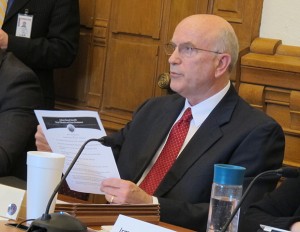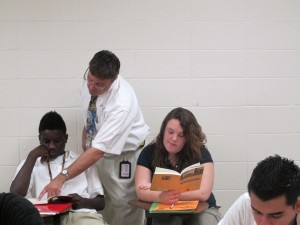New 'Parent Trigger' Bill Would Let Families, Teachers Vote To Close Schools

Kyle Stokes / StateImpact Indiana
Sen. Dennis Kruse, R-Auburn, chairs the Indiana Senate's Education Committee and recently proposed new "parent trigger" legislation.
The chair of the Indiana Senate’s Education Committee calls it “the smorgasbord menu of options for school reorganization.”
As part of a bill overhauling Indiana’s current “parent trigger” law, Sen. Dennis Kruse, R-Auburn, proposes giving parents, teachers or local school boards new powers to intervene in schools that have received at least three straight F’s from the state.
The legislation he filed Tuesday empowers any one of these groups to petition to either close a struggling school, transfer its students to schools with higher test scores or reorganize it as a charter school.
While some have criticized parent trigger measures as “inherently divisive” or as another means of diverting public dollars to private management companies, Kruse says parents in struggling schools should not have to wait through six years’-worth of F’s for the state to intervene.
“Before you get to that sixth year [of school failure], some of these students are in these schools that parents think, ‘Wow, I wish this school did better for my kid,'” Kruse told StateImpact Thursday.The state’s Legislative Services Agency reports 22 Indiana schools have received at least three straight F’s from the state, enrolling about 15,400 students.
Parents can currently petition a local school board to convert a public school into a charter — but under current law, the school board gets to make the final decision. A proposal to change the law last year never made it past the State House.
Under Kruse’s proposal, a majority vote from the school board, petition signatures from 51 percent of a school’s parents or petition signatures from 75 percent of a school’s teachers would trigger one of four possible interventions:
- Close the school and transfer students to schools with higher test scores within the district
- Turn the public school into a charter school
- Transfer any students who wanted to leave to another district
- “Any combination” of the above options (although it’s not quite clear what would constitute a “combination” of those options).
StudentsFirst, the organization former Washington, D.C. schools superintendent Michelle Rhee formed in 2010, is one of several national organizations that have advocated for parent trigger measures across the country.
But Brent Kent, Indiana State Director for StudentsFirst, says Kruse’s proposal “is missing options to improve and keep your traditional public school.”

Kyle Stokes / StateImpact Indiana
Teacher Kevin Sandorf leads a reading lesson at T.C. Howe High School in May 2012. The state ultimately took over the school.
Kent says a parent trigger bill should allow for the replacement of a school’s administrators or staff or for the overhaul of instructional methods — as federal school improvement programs do — without turning the school into a charter.
“I’m hopeful we’ll see a big revision or a more comprehensive House version,” Kent says.
Kruse says parents or teachers filing parent trigger petitions could negotiate with school leaders to include measures short of reorganizing.
“Some of that intervention is already in place now, so if that’s not worked, then the full reorganization option needs to be available,” Kruse says.
Skeptics fear parent trigger bills could make a bad situation worse.
“It is inherently divisive: what about the 49 percent, or 30 percent, or whatever percent of parents who don’t want the changes the majority demands? They’ve got no choice but to fight it out with their neighbors,” Neil McCluskey of the Cato Institute told StateImpact Florida.
Education historian Diane Ravitch argues parent trigger laws can only benefit private management companies who would run the charter schools opened in place of a traditional public school. She writes in The New York Times:
Public schools don’t belong to the 51 percent of the parents whose children are enrolled this year. They don’t belong to the teachers or administrators. They belong to the public. They were built with public funds. The only legitimate reason to close a neighborhood public school is under-enrollment. If a school is struggling, it needs help from district leaders, not a closure notice.
